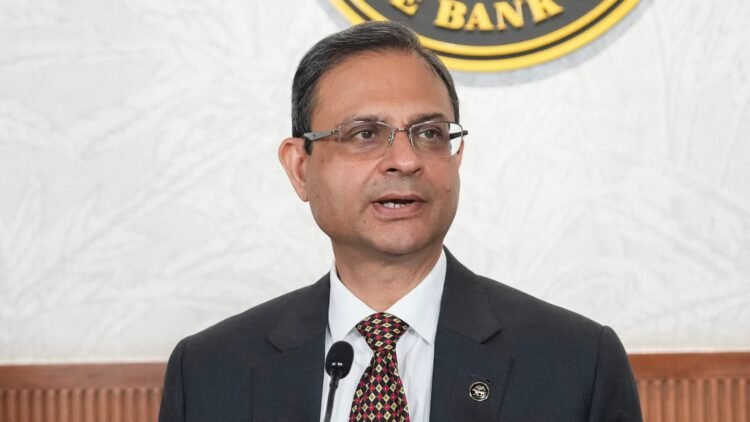RBI Governor Sanjay Malhotra on Monday said India’s economy, averaging 8% growth in four years, is backed by record forex reserves and inflation at an eight-year low of 1.6%.
MUMBAI (India CSR): Reserve Bank of India (RBI) Governor Sanjay Malhotra on Monday said India’s headline inflation fell to an eight-year low of 1.6 per cent in July 2025, reflecting the success of monetary and fiscal measures in stabilising the economy amid global volatility.
Delivering the inaugural address at the FIBAC 2025 Conference on the theme “Charting New Frontiers”, Malhotra said proactive interest rate moves, liquidity management by the RBI, and government supply-side steps helped contain price pressures despite food, oil and geopolitical shocks. “Anchored inflation expectations have supported stable consumption patterns and improved investor confidence,” he said.
India’s Growth and Fiscal Stability
The Governor pointed out that India has averaged 8 per cent annual GDP growth between 2021–22 and 2024–25, supported by robust domestic demand. The IMF projects India to remain the fastest-growing major economy, soon becoming the third-largest economy globally.
He said fiscal consolidation has progressed significantly, with the Centre’s deficit targeted to decline from 9.2 per cent of GDP during the pandemic to 4.4 per cent in FY26. Effective capital expenditure is budgeted at 4.3 per cent of GDP. Corporate balance sheets are stronger, while banks are well-capitalised, liquid, and profitable.
External Sector Strength
Malhotra highlighted that India’s current account deficit stood at 0.6 per cent of GDP in 2024–25, well within sustainable levels, due to strong services exports and remittances. Capital inflows have exceeded requirements, pushing forex reserves to USD 695 billion as of August 15, 2025, equivalent to 11 months of import cover.
Regulatory Priorities
He said the RBI is preparing to implement Basel III guidelines for credit, market and operational risk from April 2027, with draft rules on expected credit loss models to be released soon. A new Regulatory Review Cell will examine all regulations every 5–7 years to ensure efficiency and consistency.
Malhotra underlined that regulation must strike a balance between growth and safety. “Regulations are like friction. Too little and one falls; too much and progress is impeded. Our task is to find the right amount of friction,” he said.
Financial Inclusion and Customer Focus
On inclusion, he noted that while almost all villages have banking access within five kilometres, gaps remain in usage and quality. He urged banks to strengthen the Business Correspondent model and expand services, alongside boosting MSME credit via the Unified Lending Interface (ULI).
He also called for customer-centric banking, stressing better grievance redressal, stronger Ombudsman systems, and linking customer satisfaction KPIs to the performance appraisals of key officials.
Technology and Future Growth
Malhotra emphasised greater adoption of technology, citing platforms like Account Aggregator, ULI and PRAVAAH as transformative. The RBI itself is adopting AI and ML in its functions, and he urged regulated entities to accelerate digital adoption to expand credit and reduce costs.
Shared Vision of Growth
Concluding, he said regulators and banks are “on the same team with a shared vision of a Viksit Bharat by 2047.” Urging corporates and banks to drive a fresh investment cycle, he added: “If in doubt, follow Gandhi’s Talisman. Always think of how your actions will impact the most vulnerable.”
Key News Takeaways:
- Inflation fell to 1.6% in July 2025, the lowest in 8 years.
- India’s GDP grew 8% annually in the past 4 years.
- Fiscal deficit to narrow to 4.4% of GDP in FY26.
- Forex reserves at USD 695 bn, covering 11 months of imports.
- Basel III norms from April 2027; Regulatory Review Cell to assess rules every 5–7 years.
- Push for MSME credit, re-KYC camps and Business Correspondent expansion.
- RBI urges customer satisfaction KPIs in banks and stronger grievance systems.
- Banks and corporates urged to lead a new investment cycle.
(India CSR)






















